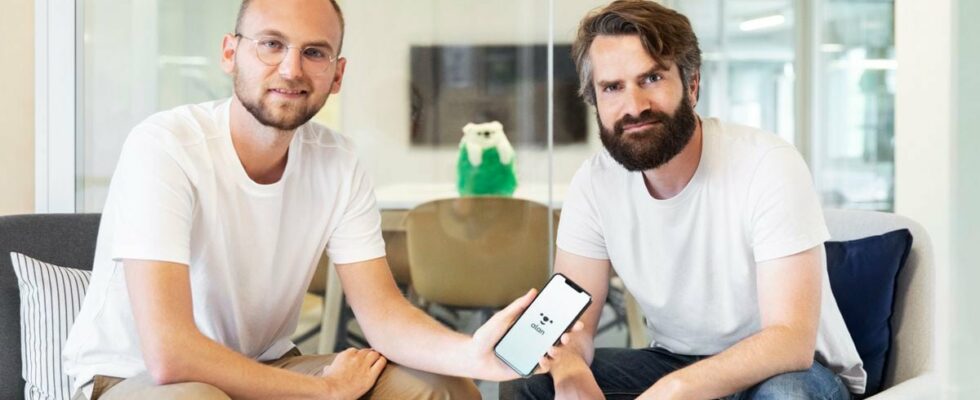TV, radio, international summits… In one year, the co-founder of French company Mistral AI, Arthur Mensch, has become a global star. In the shadow of this lightning success, two figures from French Tech played an important role: Jean-Charles Samuelian-Werve and Charles Gorintin, the creators of the neoinsurer Alan. “We saw that generative artificial intelligence was going to take a major place in the health of citizens. It was essential that European champions could emerge,” explains the duo, who contributed to the launch of Mistral and have been supporting it ever since. The two acolytes have been immersed in AI and data for a long time. This is even what allowed them to break through the insurance fortress. An area long shunned by venture capital funds who preferred gleaming fintechs promising to revolutionize payment methods to cautious insurtechs.
Insurance is, moreover, a market run by historical players and difficult to compete with. “They have accumulated decades of figures, which gives them a major advantage in calculating risk precisely,” argues one investor. Insurance consultant and co-founder of Okko Operating Partners, Alexandre Rispal also observes that “the first players in insurtech have often had difficulty finding a profitable model, with controlled acquisition costs”.
The Internet, however, is a data Eldorado. And Alan’s founders understood this. When the company was created in 2016, they scanned the web extensively, collected competitive offers, and questioned companies about the contracts they had signed. Then they put everything through a sieve of sophisticated mathematical formulas, in order to build their own grid.
At Alan, artificial intelligence is everywhere. “Originally, our teams manually transcribed the tens of thousands of invoices received each month. Today, our AI analyzes them automatically, underlines Charles Gorintin, the CTO. This allows us to reimburse 90% of care in less than twenty-four hours, and some in less than a minute.” AI also helps track fraud. Suggests personalized prevention programs to policyholders, validated by a professional Responds to simple questions and provides customer service with the appropriate information to quickly process complex requests “We reduced our management costs per user by 28% this year, mainly thanks to the automation of our processes,” summarizes Jean-. Charles Samuelian-Werve In health insurance, AI can also help “better understand the behavior of policyholders – the patterns of healthcare consumption – and identify weak signals”, argues Jean-Louis Delpérié, partner of the strategy consulting firm Simon Kucher.
Health coach and virtual clinic
Alan’s founders gave their mobile app a central role. Happy colors, neat icons… Space has the feel of a video game. With its educational content, its tools of cat and teleconsultation, it is as much a health coach as it is a virtual clinic. All this is not – only – for the customer’s sake: if policyholders are subject to better prevention, they will cost less in care. Win-win. This commitment to prevention makes all the more sense as the main causes of death will change over the next 15 years. “By 2050, diseases such as cancer, diabetes, cardiovascular and respiratory diseases will represent 86% of the 90 million annual deaths,” points out Philippe Lefèvre, partner at Wavestone and co-author of the Assurtech Radar 2023. Companies in the sector will therefore have to review their insurance model by strengthening preventive care, encouraging partnerships in the health field and innovating in the insurance offering.”
Eight years after its creation in France, the Alan unicorn has only launched in two other countries: Spain and Belgium. But the soufflé rises. “Their value proposition is unique,” argues Maya Noël, CEO of the France Digitale start-up association. In 2023, Alan increased his figure by 36%, to €350 million, and reduced his losses by 18%. The company now covers 500,000 workers.
“Alan has made a breakthrough in the market but must show his ability to manage a profitable health portfolio over the long term,” underlines Jean-Louis Delpérié of the Simon Kucher firm. And this, in a rapidly changing market: “the strong standardization of contracts with the care basket of the responsible contract, but also the increase in health consumption among the French is leading to strong pressure on margins.”
The unicorn Alan plans to cross the threshold of balance in 2026. The National Assembly, Duracell, Celio… It is true that it has multiplied the great catches. His latest, the Ministry of Ecological Transition, however, caused a stir. “They are a little cheaper on certain options but more expensive on the basket of basic care,” laments Luc Farré, secretary general of Unsa-Public Service. The MGEN, which challenged the State’s choice of Alan, was however dismissed on June 5. “The major difference between the candidates is the options, but above all the management fees, which are intended to be applied throughout the duration of the market. We are much cheaper here than our competitors,” points out the CEO of Alan. The case in any case reminds us of the direction to take: innovative or “traditional”, the insurers’ battle will be won on prices.
.
